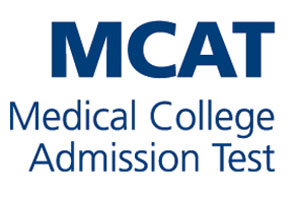The GRE physics test is an examination administered by the Educational Testing Service (ETS). The test attempts to determine the extent of the examinees' understanding of fundamental principles of physics and their ability to apply them to problem solving. Many graduate schools require applicants to take the exam and base admission decisions in part on the results.
The SAT is a standardized test widely used for college admissions in the United States. Since it was debuted by the College Board in 1926, its name and scoring have changed several times; originally called the Scholastic Aptitude Test, it was later called the Scholastic Assessment Test, then the SAT I: Reasoning Test, then the SAT Reasoning Test, then simply the SAT.

The Graduate Management Admission Test is a computer adaptive test (CAT) intended to assess certain analytical, writing, quantitative, verbal, and reading skills in written English for use in admission to a graduate management program, such as an MBA program. It requires knowledge of certain specific grammar and knowledge of certain specific algebra, geometry, and arithmetic. According to the test-owning company, the Graduate Management Admission Council (GMAC), the GMAT assesses analytical writing and problem-solving abilities, while also addressing data sufficiency, logic, and critical reasoning skills that it believes to be vital to real-world business and management success. It can be taken up to five times a year but no more than 8 times total. Attempts must be at least 16 days apart.

Educational Testing Service (ETS), founded in 1947, is the world's largest private nonprofit educational testing and assessment organization. It is headquartered in Lawrence Township, New Jersey, but has a Princeton address.

The Law School Admission Test (LSAT) is a half-day standardized test administered six times each year at designated testing centers throughout the world. The Law School Admission Council (LSAC) administers the LSAT for prospective law school candidates. It is designed to assess reading comprehension as well as logical and verbal reasoning proficiency. The test is an integral part of the law school admission process in the United States, Canada, the University of Melbourne, Australia, and a growing number of other countries.
The United States Medical Licensing Examination (USMLE) is a three-step examination for medical licensure in the United States and is sponsored by the Federation of State Medical Boards (FSMB) and the National Board of Medical Examiners (NBME). Physicians with an MD degree are required to pass this examination before being permitted to practice medicine in the United States; see below for requirements of physicians with a DO degree.

The Triple Nine Society (TNS) is an international high IQ society for adults whose score on a standardised test demonstrates an IQ at or above the 99.9th percentile of the human population. The Society recognizes scores from over 20 different tests of adult intelligence. The Triple Nine Society is a non-profit, 501(c)(7) organization incorporated in Virginia, USA. The organization was founded in 1978. As of October 2018, TNS reports a member base of over 1,900 adults residing in 50 countries. The Society's constitution encourages friendship, communication, and intellectual exploration. TNS members communicate online, at gatherings, and through Vidya, the Society's bimonthly journal.
The Miller Analogies Test (MAT) is a standardized test used both for graduate school admissions in the United States and entrance to high I.Q. societies. Created and still published by Harcourt Assessment, the MAT consists of 120 questions in 60 minutes. Unlike other graduate school admissions exams such as the GRE, the Miller Analogies Test is verbal or computer based.
The GRE subject test in mathematics is a standardized test in the United States created by the Educational Testing Service (ETS), and is designed to assess a candidate's potential for graduate or post-graduate study in the field of mathematics. It contains questions from many fields of mathematics; about 50% of the questions come from calculus, 25% from algebra, and 25% from a broad variety of other topics typically encountered in undergraduate mathematics courses, such as point-set topology, probability and statistics, geometry, and real analysis.
GRE Subject Biochemistry, Cell and Molecular Biology was a standardized exam provided by ETS that was discontinued in December 2016. It is a paper-based exam and there are no computer-based versions of it. ETS places this exam three times per year: once in April, once in October and once in November. Some graduate programs in the United States recommend taking this exam, while others require this exam score as a part of the application to their graduate programs. ETS sends a bulletin with a sample practice test to each candidate after registration for the exam. There are 180 questions within the biochemistry subject test.
Holistic grading, in standards-based education, is an approach to scoring essays using a simple grading structure that bases a grade on a paper's overall quality. This type of grading contrasts with analytic grading, which takes more factors into account when assigning a grade. Holistic grading can also be used to assess classroom-based work. Rather than counting errors, a paper is judged holistically and often compared to an anchor paper to evaluate if it meets a writing standard.
Frederic Mather Lord was a psychometrician for Educational Testing Service. The SAT, GRE, GMAT, LSAT and TOEFL are all based on Lord's research.
Incremental validity is a type of validity that is used to determine whether a new psychometric assessment will increase the predictive ability beyond that provided by an existing method of assessment. In other words, incremental validity seeks to answer if the new test adds much information that might be obtained with simpler, already existing methods.

The University of Washington Department of Bioengineering is a joint department of the College of Engineering and School of Medicine, and is located in Seattle, Washington, USA.

The Medical College Admission Test (MCAT) is a computer-based standardized examination for prospective medical students in the United States, Australia, Canada, and Caribbean Islands. It is designed to assess problem solving, critical thinking, written analysis and knowledge of scientific concepts and principles. Prior to 2006, the exam was a paper-and-pencil test; since 2007, all administrations of the exam have been computer-based.
A Group Test consists of tests that can be administered to a large group of people at one time. This is opposite of an Individual Test, which is administered to one person at a time, typically by someone receiving payment to administer the test. Most testing today is administered as group tests considering the many benefits that are associated with these tests. Considering the many standardized tests that are administered each year, it is understandable that many of these are group tests. Examples of group tests include statewide testing throughout K-12 students, placement examinations into college, and placement examinations into graduate coursework.







